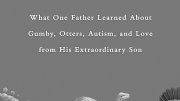In the 12 years that Tom Fields-Meyer ’84 spent writing human-interest stories for People magazine, never did he consider writing about his own family. Only on the eve of his departure from People in 2007, when his editor approached him on the subject, did he think of writing that personal story.
In fact, he had been taking notes on his family all along—mainly through short e-mails sent to himself—beginning in 1999, around the time his then-three-year-old son, Ezra, was diagnosed with autism. As his son’s development veered off course, Fields-Meyer says he needed a way to process what was happening and he turned, unsurprisingly, to the written word.
“I never expected those notes to be anything more than my own personal record,” he explains. But rediscovering them as he wrote his People story, he recognized their greater potential. His journalist’s eye told him that each little episode with Ezra—a moment of frustration, exploration, growth, or gratifying communication—might together be a story worth sharing. He had always wanted to write books, but lacked time, as a full-time journalist and father, and a topic. Writing Ezra’s story would bring together both parts of his life. As a final assignment for People, he sat down and wrote one episode—“Ezra at the Zoo”—and then kept going.
As he began to write, Fields-Meyer looked not only to his e-mail notes but also to Ezra himself, who has a prodigious memory. The father would ask his son to relate details from events, or mention their specific dates, and Ezra never failed. “For the book about me?” “Yes, we went to the zoo on January 5, 2002.” “Yes, I looked at the gorillas and then the elephants.” “No, I didn’t want to leave.” As Fields-Meyer wrote, father and the son relived their years together. Following Ezra: What One Father Learned About Gumby, Otters, Autism, and Love from His Extraordinary Son (NAL/Penguin) was published last September.
The title comes from one of the book’s first scenes. Fields-Meyer writes about how, soon after Ezra’s diagnosis, a well-meaning therapist suggested the Fields-Meyers take time to “grieve for the child [their son] didn’t turn out to be.” Baffled, Fields-Meyer looked at to his wife and then back at the therapist. The idea seemed absurd. Instead, Fields-Meyer vowed “never to mourn,” but instead “to pour love on [his] son, to celebrate him, to understand, to support him, and to follow his lead.”
Following Ezra’s warm, poignant, and often hilarious episodes touch on the fundamental matter of parenting: how parents reconcile their expectations of and hopes for how their children will turn out with the mess of reality. For Fields-Meyer, the answer to this question is simple: he writes, “Long ago I made my choice: to follow Ezra and to watch, in awe and mystery, as my son makes his own unique way in the world.”
The book has struck a chord; Fields-Meyer has been delighted by responses that have enabled him to make contact with the larger community of parents raising autistic children, or raising children in general. One father of a four-year-old autistic son wrote, “Your book is the first thing that’s given me hope.” Fields-Meyer says writing the book was worth it just for the sake of that one man.
He intends to write more books, but in the meantime, proudly reports that 15-year-old Ezra has become a published author himself. A huge animation fan, his son has been making his own animations for years and one of them, “Alphabet House,” attracted the attention of children’s-book author Tom Lichtenheld, who asked to collaborate with him to adapt the video into a picture book (see www.youtube.com/watch?v=hve4DenyATU). The result, E-mergency! was published in October.











